Are you ready to embark on a journey that will unravel the mysteries of the Miniature Pinscher breed?
Step into the world of these pint-sized powerhouses and discover the unique characteristics that make them stand out in the dog kingdom.
From their origin as fearless rat hunters to their vibrant personalities and potential health concerns, there is much to uncover about these spirited companions.
So, prepare yourself for an exploration into the world of Miniature Pinschers, where surprises await at every turn.
Key Takeaways
- Miniature Pinschers are spirited, confident, and fearless dogs with nonstop energy and intelligence.
- They make excellent watchdogs and are affectionate and loving with their family.
- Miniature Pinschers are generally a healthy breed but can be prone to certain health conditions, such as Progressive Retinal Atrophy (PRA) and Legg-Calve-Perthes Disease.
- When choosing a dog for an apartment, factors such as energy levels, behavior towards neighbors, and qualities like being quiet, low-energy, and well-mannered should be prioritized.
Origin and History
The Miniature Pinscher, also known as the Min Pin, originated in Germany as a small terrier breed developed to eliminate rats in homes and stables. They were first called the Reh Pinscher due to their resemblance to the reh, a small deer.
The development of the breed took off in 1895 with the formation of the Pinscher Klub. They were first shown at the Stuttgart Dog Show in Germany in 1900 and were later imported to the United States around 1919.
The Miniature Pinscher is a toy-sized breed, with males and females standing 10 to 12.5 inches high and weighing 8 to 11 pounds. They have a short, smooth coat in a variety of colors.
Size and Physical Characteristics
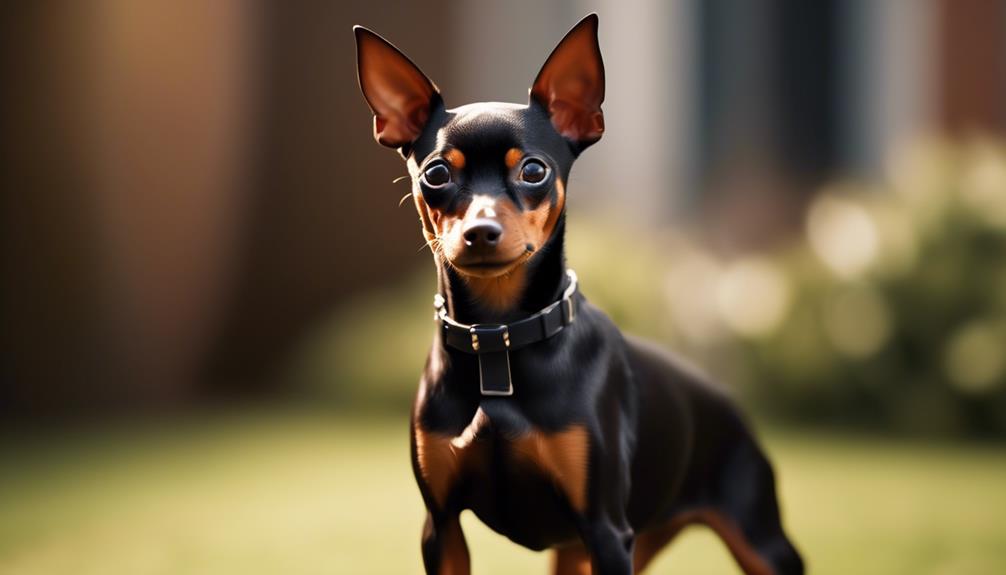
Now let's turn our attention to the size and physical characteristics of the Miniature Pinscher breed.
Miniature Pinschers are considered a toy-sized breed, with males and females standing 10 to 12.5 inches high and weighing 8 to 11 pounds.
They have a compact and muscular body, with a sleek and smooth coat that comes in a variety of colors. Their coat requires minimal grooming, making them low maintenance in terms of grooming needs.
In terms of physical characteristics, Miniature Pinschers have a stately appearance and a self-assured attitude. They are known for their fearless and energetic nature, always ready for action. With their alertness and agility, they make excellent watchdogs.
Personality Traits
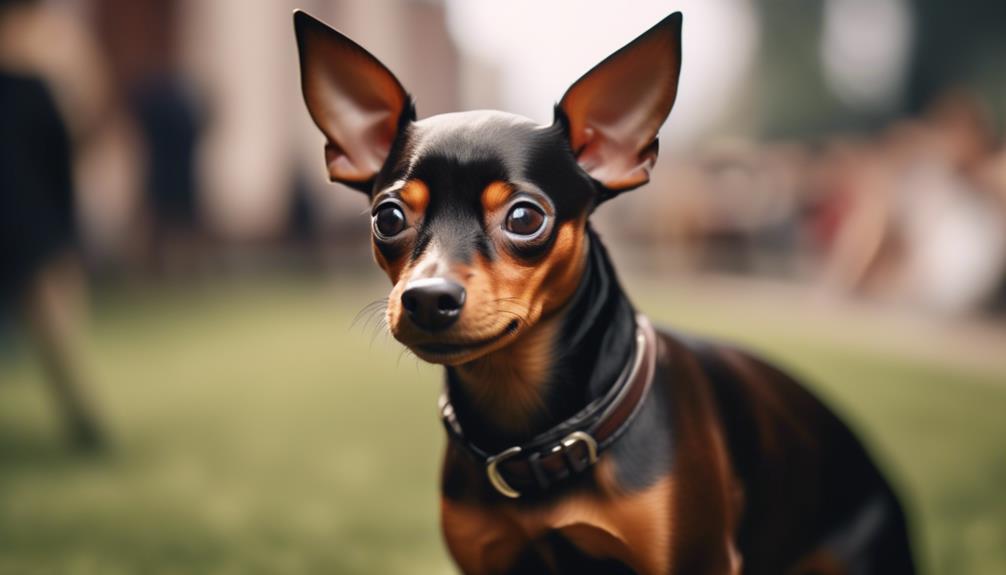
What makes the Miniature Pinscher breed stand out in terms of their personality traits?
- Miniature Pinschers are known for their spirited, confident, and fearless nature. They're intensely curious and always ready for action, exhibiting nonstop energy and intelligence.
- With their excellent watchdog abilities, they're always on high alert to protect their family. Despite their small size, they've a big personality and aren't afraid to show it.
- Miniature Pinschers are affectionate and loving with their family, forming strong bonds with their loved ones.
- Their stately appearance and self-assured attitude make them stand out in a crowd.
- However, it's important to note that some Miniature Pinschers may display aggression towards humans, so proper socialization and training are essential.
Health Concerns
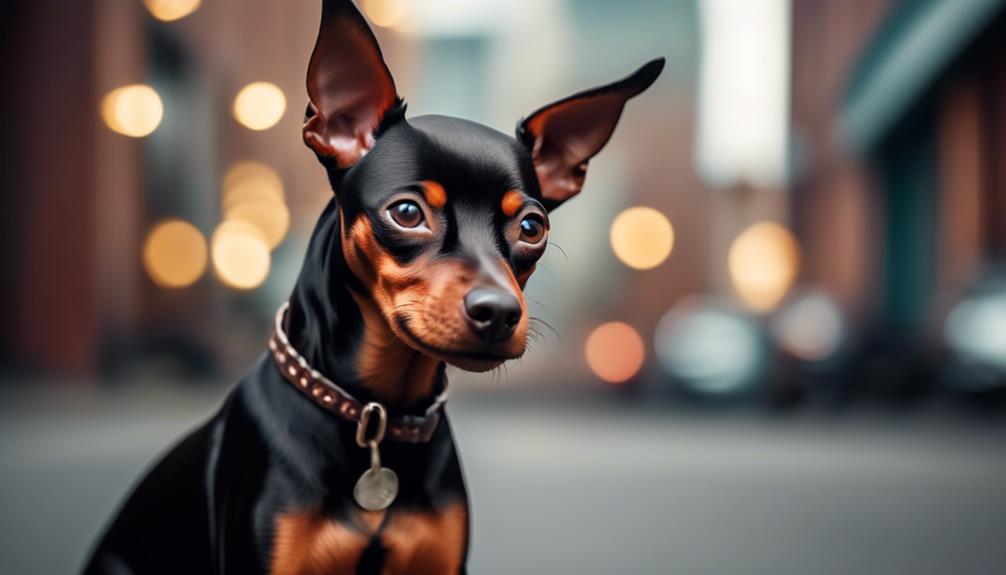
When considering the health concerns of Miniature Pinschers, it's important to be aware of potential conditions that can affect this breed. Here are four health concerns that you should keep in mind:
- Progressive Retinal Atrophy (PRA): This condition can cause a gradual deterioration of the retina, leading to vision loss. It's crucial to monitor your Miniature Pinscher's eyesight and seek veterinary care if you notice any changes in their vision.
- Legg-Calve-Perthes Disease: This condition affects the hip joint and can be corrected with surgery. Watch out for symptoms such as limping or difficulty in walking, and consult your veterinarian if you suspect your Miniature Pinscher may be suffering from this condition.
- Hip Dysplasia and Elbow Dysplasia: These are developmental disorders that affect the joints, causing pain and mobility issues. Regular check-ups and appropriate exercise can help manage these conditions.
- Von Willebrand's Disease: This is a blood clotting disorder that can cause excessive bleeding. It's important to be aware of this condition and inform your veterinarian, as certain medications and procedures may need to be approached with caution.
Care and Training Tips
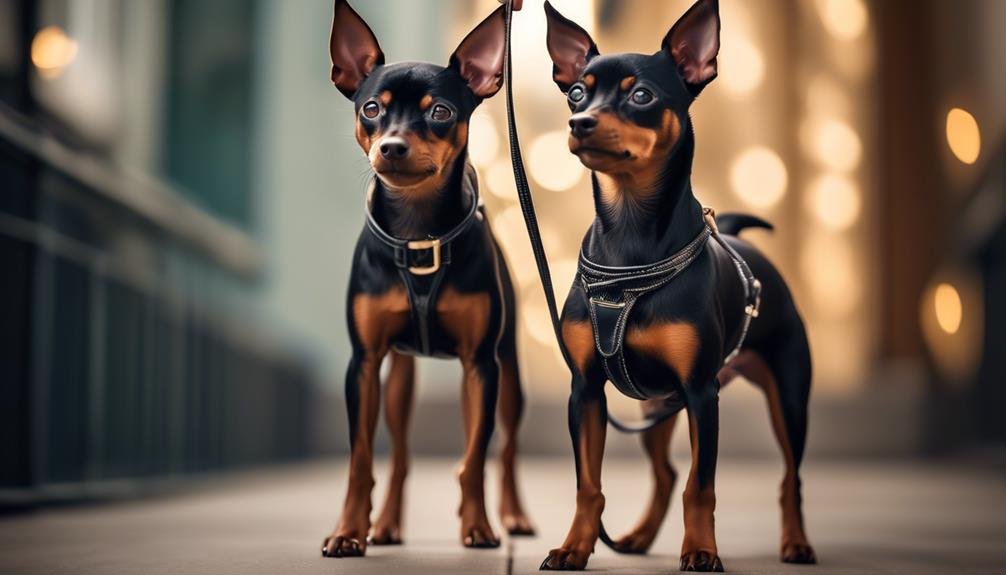
To ensure the well-being of your Miniature Pinscher, it is important to understand the care and training tips that will help you raise a happy and well-behaved companion. Here are some key tips to keep in mind:
| Care Tips | Training Tips |
|---|---|
| Provide regular exercise | Start training early |
| Feed a balanced diet | Use positive reinforcement techniques |
| Maintain regular vet check-ups | Socialize your dog with people and other animals |
| Keep up with grooming | Be consistent with rules and boundaries |
| Provide mental stimulation | Use crate training for housebreaking |
Adaptability and Apartment Living
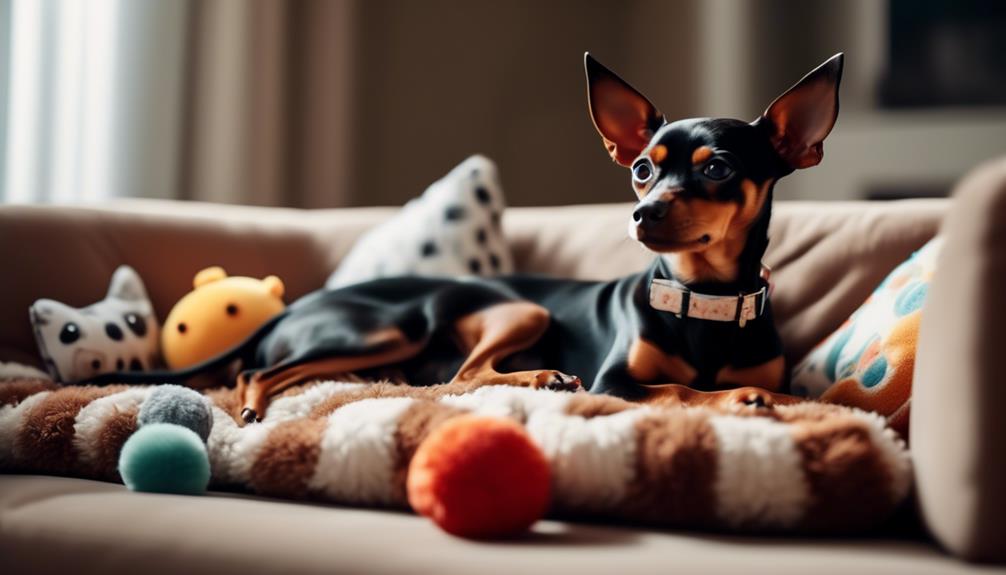
If you're considering a Miniature Pinscher as a pet for your apartment, you'll be pleased to know that they're highly adaptable to apartment living. Here are four reasons why they make great apartment dogs:
- They're small in size, making them suitable for smaller living spaces.
- Miniature Pinschers have low exercise requirements, so they don't need a large yard or excessive outdoor activities.
- They're generally quiet and don't bark excessively, which is important when living in close proximity to neighbors.
- Miniature Pinschers are known for their good manners and adapt well to indoor living, making them well-suited for apartment lifestyles.
With their adaptability and apartment-friendly qualities, a Miniature Pinscher can be the perfect companion for apartment dwellers.
All-around Friendliness
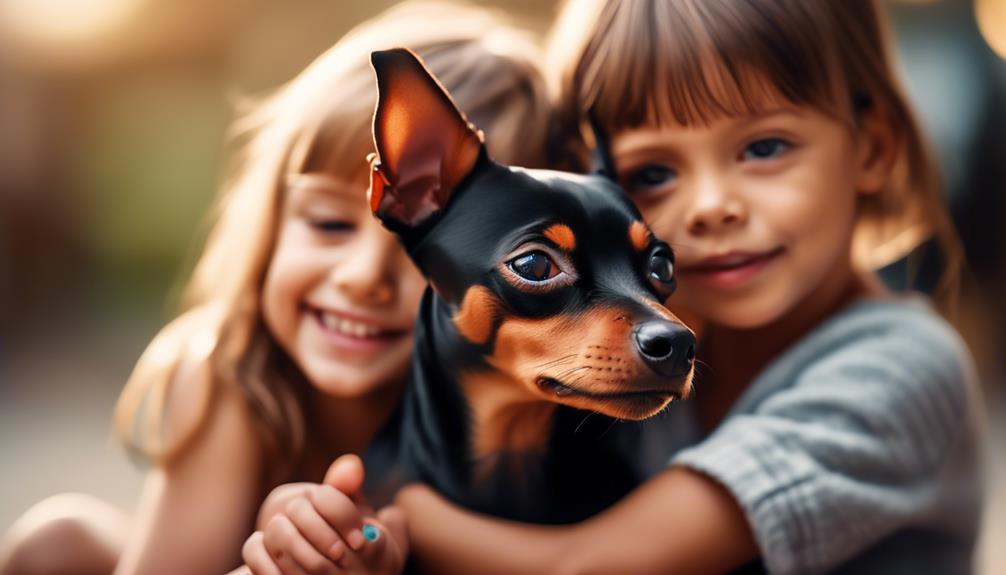
Miniature Pinschers are affectionate and loyal companions, known for their unconditional love and stately appearance. They enjoy the company of their families and are good with children. With their fearless and energetic nature, they make alert and devoted companion dogs.
When it comes to all-around friendliness, Miniature Pinschers excel in their affectionate behavior towards their loved ones. They're known to be loving and loyal, always seeking the companionship of their family members. Whether it's cuddling on the couch or playing in the yard, these dogs are happiest when surrounded by their loved ones.
Their stately appearance and self-assured attitude add to their charm, making them an all-around friendly and loving breed.
Aggression Towards Humans
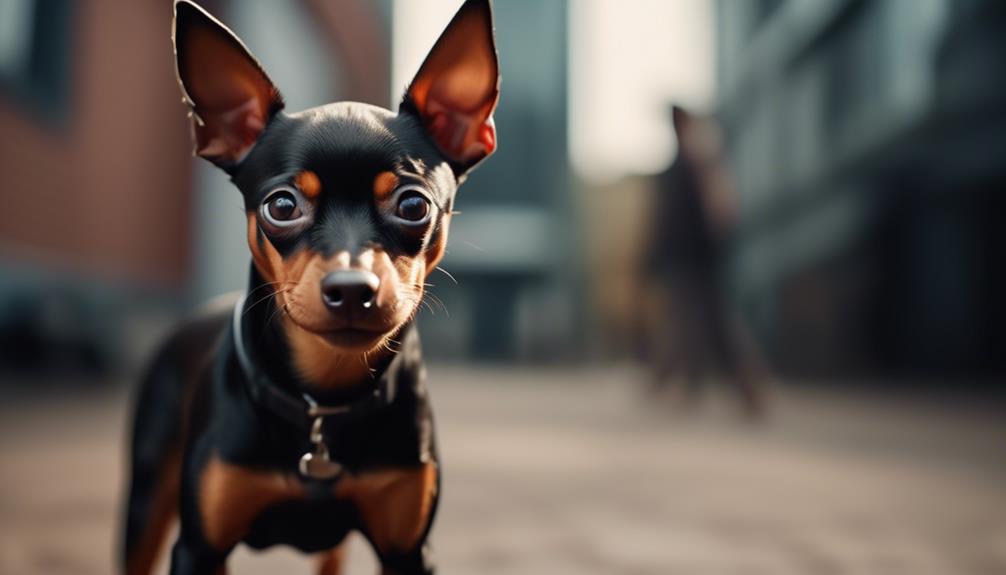
Aggression towards humans can be a serious concern when it comes to Miniature Pinschers. These little dogs may display aggression out of fear, territoriality, or protective instincts. It's crucial to properly socialize and train them to prevent aggressive behavior.
If you notice any signs of aggression, seek professional help and use behavior modification techniques. Understanding the triggers and signs of aggression can help prevent dangerous situations. Remember, aggression isn't a trait exclusive to any particular breed, and with the right approach, it can be managed effectively.
Stay vigilant, provide a safe environment, and give your Miniature Pinscher the guidance and training they need to be a well-behaved and loving companion.
Tendency to Bark or Howl
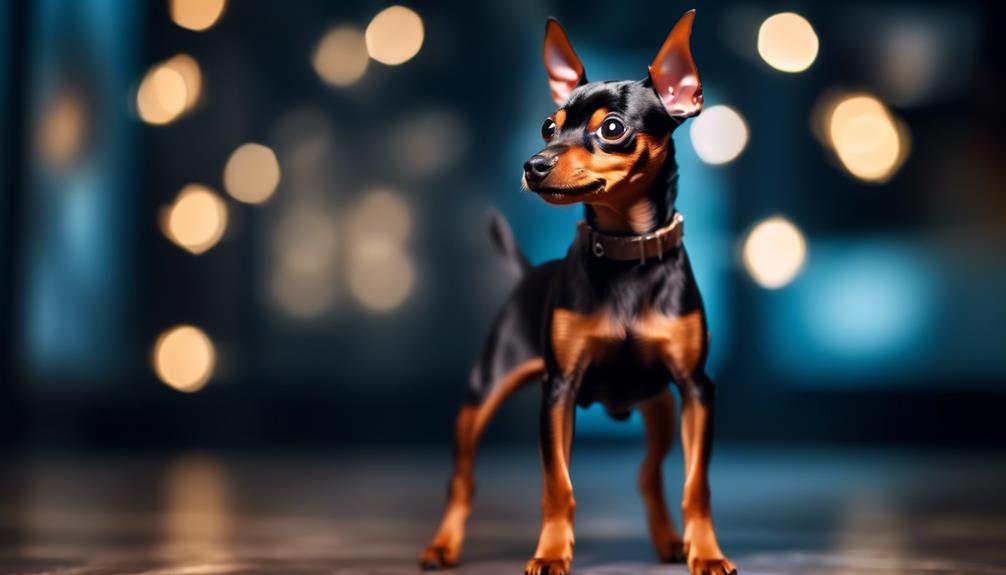
When it comes to Miniature Pinschers, their tendency to bark or howl is another important characteristic to consider. These dogs are known for being alert and energetic, which can contribute to their vocal nature. Miniature Pinschers have a strong instinct to alert their owners of any potential danger or unfamiliar presence.
While this can make them excellent watchdogs, it also means that they may bark more frequently than some other breeds. It's important to keep in mind that excessive barking can be a nuisance, especially if you live in a noise-restricted area or have nearby neighbors.
Training and mental stimulation can help minimize excessive barking and keep your Miniature Pinscher happy and well-behaved.
Exercise Needs and Playfulness
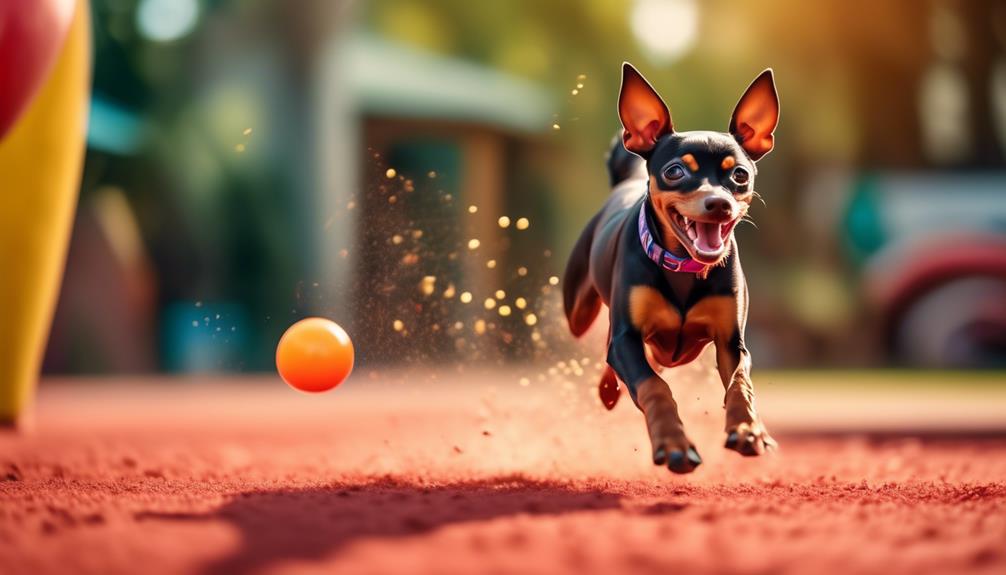
To ensure the overall well-being of your Miniature Pinscher, it's important to address their exercise needs and playfulness. Here are four key points to consider:
1) Regular exercise is crucial: Miniature Pinschers are energetic and require daily exercise to burn off their excess energy. This can be achieved through brisk walks, interactive play sessions, or even agility training. Providing them with enough physical activity will help prevent behavioral issues and promote their overall health.
2) Mental stimulation is essential: These intelligent dogs thrive on mental stimulation. Engage their minds with puzzle toys, obedience training, or interactive games. This will help keep them mentally sharp and prevent boredom.
3) Playtime is a must: Miniature Pinschers have a playful nature and enjoy interactive playtime with their owners. Whether it's playing fetch, tug-of-war, or simply having a game of hide-and-seek, regular play sessions will strengthen the bond between you and your furry friend.
4) Provide them with a variety of toys: Miniature Pinschers love to chew, so make sure to provide them with a range of appropriate toys to keep them occupied and prevent destructive chewing behavior. Toys that challenge their problem-solving skills, such as treat-dispensing toys, are especially beneficial.
Frequently Asked Questions
Are Miniature Pinschers Good With Other Pets in the Household?
Yes, Miniature Pinschers can be good with other pets in the household. Proper socialization and introductions are key. Monitor their interactions and provide a safe and supervised environment for everyone involved.
How Often Should Miniature Pinschers Be Groomed?
You should groom your Miniature Pinscher regularly to keep their short, smooth coat looking its best. Brush them weekly, check their ears and teeth, trim their nails when needed, and give them a bath as necessary.
Can Miniature Pinschers Be Left Alone for Long Periods of Time?
Yes, Miniature Pinschers can be left alone for long periods of time, but it's not ideal. They thrive on companionship and may develop separation anxiety. Consider hiring a dog sitter or providing plenty of mental and physical stimulation.
Do Miniature Pinschers Have a Tendency to Dig in the Yard?
Yes, Miniature Pinschers have a tendency to dig in the yard. It's a natural behavior for them, so providing proper mental and physical stimulation can help redirect their digging instincts.
Are Miniature Pinschers Prone to Separation Anxiety?
Yes, Miniature Pinschers are prone to separation anxiety. They form strong bonds with their owners and can become anxious when left alone for long periods. Proper training, mental stimulation, and gradual alone time can help alleviate this issue.
What are the similarities and differences between Miniature Pinschers and Patterdale Terriers?
Miniature Pinschers and Patterdale Terriers have similar breed characteristics, such as their small size and high energy levels. However, Patterdale Terriers tend to be more stubborn and independent compared to the Miniature Pinschers. Both breeds are known for their affectionate nature and make great companions for active individuals.
Conclusion
In conclusion, if you're looking for a lively and spirited companion, the Miniature Pinscher could be the perfect breed for you. Originating from Germany, these dogs were bred to hunt rats and have since become popular as watchdogs and beloved family pets.
Their nonstop energy and intelligence make them excellent companions for active individuals or families. However, their strong personality and high energy levels require early socialization and training.
Overall, the Miniature Pinscher is a spirited and affectionate breed that can bring joy to your life.




